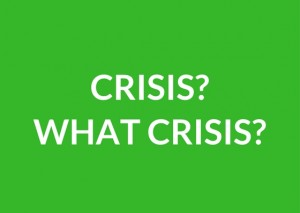
Many organisations will face challenges from time to time that count as a crisis. When these situations arise, they will need both effective communication and appropriate actions to get through it.
Often the comms effort will be focussed outside the organisation. But what part can – and should – internal communication play?
That was the question addressed at last week’s CharityComms Internal Comms Special Interest Group. Thanks to the insight provided by the speakers, we all came away more determined than ever to ensure internal comms is making the kind of difference we know it can.
Here are 20 top tips from the day:
- Think about who owns reputation management at your organisation. Although everyone has a level of responsibility and contribution to make, someone should have ultimate ownership, so that nothing is forgotten.
- For the best chance of handling a crisis effectively at the point when it happens, you should have been building up organisational resilience over time. In other words, think about what will need to be true so that you can cope and work towards putting everything you will need in place in advance.
- Scenario planning can be incredibly helpful. What kinds of situations might arise that cause a potential reputational risk? And if that did happen, what might your communications look like to address concerns that arise?
- Create a stakeholder map so that you know who your organisation is engaging with and what you want them to think of you. This includes your staff and volunteers. This will help you proactively manage those relationships and avoid any issues or misunderstandings that might damage your reputation.
- If you face a damaged reputation as an organisation – whatever the cause – the communication focus can often be on firefighting external issues. Remember that internal communication is just as important, since it can bring everyone together internally to face the challenges as one.
- If your leadership team are concerned about the organisation’s reputation externally, this gives the internal comms team a great opportunity to go to them and show how you can help. For example, “You’re worried about what our clients think of us – internal comms can provide strong, consistent messages for our frontline people to use.”
- When you are managing your organisation’s reputation, your comms need to be authentic and trustworthy. Internally this means giving your people a voice and letting them speak up so that your comms are from and for everyone, not just imposed from the top. This will invariably involve embracing self-written wonky comms – and that’s OK!
- If your internal comms processes are embedded in your organisation already, everyone will know what to do and how it works. Then if you are faced with a crisis, you can focus on message and content, not on working out how to make it work logistically.
- When you are communicating with your people during a crisis, try to make sure that your approach is something that you can repeat in the future if you need to. As with the previous tip, you want to be able to focus on messages, not communication principles.
- You will often find that your people are as cross about an attack on your organisation’s reputation as you are. Using their voices to demonstrate the difference you are making every single day is very powerful.
- A key role of internal communication during a crisis is to ensure that your people are armed with the information and messages they need to respond to criticism they face personally. They may be quizzed by their family and friends or be trolled online. Take time to listen to them about the questions and accusations they receive. Then give them what they need to respond in a consistent way.
- As an organisation you need to be sure that you are right and then be bold, simple and clear with your messages.
- Consider using the same statement about the crisis internally and externally. The messages and tone of voice should reflect who you are.
- Work with your leaders to ensure they have the right communication skills to cope with a crisis. This includes being able to talk to teams internally and listen to what they are really saying, as well as acting as media spokespeople.
- Acknowledge that your leaders will have different levels of risk aversion. This will have an influence on the kinds of messages they want to use and the information they are prepared to share. If you understand those fears and motivations, you can work with them to find a suitable communication line to take.
- Remember to provide briefings and support for your line managers, so that they can talk to your frontline about what is happening in a consistent and supportive way.
- Your internal comms should be helping to create an environment of trust at your organisation on an ongoing basis. Your people will then naturally turn to you as a trusted information source during difficult times, rather than believing what they read about you elsewhere.
- Remember the difference between ‘we can’t say’ and ‘we won’t say’ – again, an atmosphere of internal trust will help. If there is information that you are not able to share yet, for example during a restructure, give people a timeframe for when you can. And stick to it!
- Dealing with a crisis situation is intense, often not pleasant and draining. Remember to look after the wellbeing of your comms team. There are lots of great ideas for how to do that in Kirsty Marrins’ wellbeing guide for CharityComms
And finally, remember that communication won’t solve everything. I’ll leave you with some wise words from the room that day:
“You can’t communicate your way out of something you behaved your way into.”
If you do need to apologise, take a look at https://apologyclause.com/ for examples of how to do it well.
Let me know your tips for crisis communications.
Until next time
Sarah
